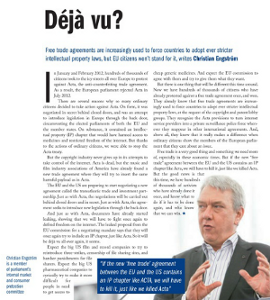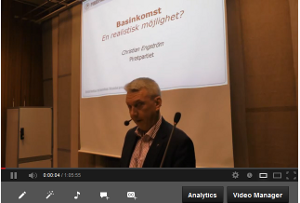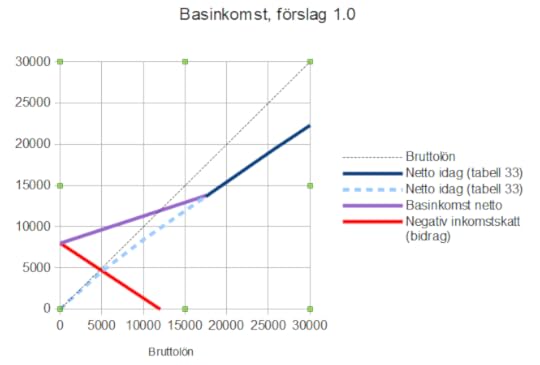Christian Engström's Blog, page 50
April 17, 2013
Insmuget Acta riskerar frihandelsavtal med USA
Trots att Europaparlamentet tydligt avvisat det mycket kontroversiella Acta-avtalet försöker EU-tjänstemän bakvägen återinföra regelverket. Den här gången dold i nya handelsavtal (TAFTA/TPIP) mellan EU och USA. Men vi tvekar inte att sänka Acta en gång till oavsett hur det paketeras, skriver jag i en debattartikel.
Läs mer hos Europaportalen

Euro-krisen ödelägger demokratin
Den gemensamma europeiska valutan – euron – har blivit en härskarring som förblindar våra politiska ledare, berövar dem sitt förnuft och binder dem alla samman, skriver jag i en debattartikel om EU.
Läs mer hos Newsmill

Stop DRM in HTML5

Read more at DefectiveByDesign.org
I just signed the following petition at DefectiveByDesign.org:
We call on the World Wide Web Consortium (W3C) and its member organizations to reject the Encrypted Media Extensions proposal (EME), which would incorporate support for Digital Restrictions Management (DRM) into HTML.
EME would be an irreversible step backward for freedom on the Web. It would endorse and enable business models that unethically restrict users, and it would make subjugation to particular media companies a precondition for full Web citizenship. Just as Flash and Silverlight are finally dying off, we should not replace them with the media giants’ latest control fantasy.
Furthermore, EME contradicts the W3C’s core values. It would hamper interoperability by encouraging the proliferation of DRM plugins. It would fly in the face of the W3C’s principle of keeping the Web royalty-free — this is simply a back door for media companies to require proprietary player software. It is willful ignorance to pretend otherwise just because the proposal does not mention particular technologies or DRM schemes by name.
W3C and member organizations: don’t weave DRM into the fabric of the Web.
Read more and sign the petition at DefectiveByDesign.org

April 16, 2013
If we need to kill the EU-US trade agreement, we will

If the new EU – US trade agreement contains an IP chapter like Acta, we will have to kill it, I write in The Parliament Magazine
The EU and the US are preparing to start negotiating a new agreement called the transatlantic trade and investment partnership. Just as with the Acta treaty, negotiations will be carried out behind closed doors and in secret. Just as with Acta, the agreement seeks to introduce ever stricter intellectual property laws through the back door.
But there is one thing that will be different this time around. Now we have hundreds of thousands of EU citizens who took to the streets to protest against the Acta treaty, and who won.
If the new ”free trade” agreement between the EU and the US contains an intellectual property (IP) chapter like Acta, we will have to kill it, just like we killed Acta, I write in an opinion piece in The Parliament Magazine.
Read more at The Parliament Magazine web site (or in the electronic version of the printed magazine)

April 10, 2013
Follow-up questions to the EU Parliament President on #mepblock

Martin Schulz, President of the European Parliament
This Monday, I received a reply from the President of the European Parliament Martin Schulz, where he confirmed that a decision to block certain emails from citizens to members of the parliament was taken on March 7, and said that this decision was ”justified”.
Since I strongly disagree with the President’s position on this, I have now sent the following letter asking for some clarifications:
Dear President Schulz,
Thank you for your letter dated March 28, and delivered on April 8, where you defend blocking emails sent by citizens to Members of the European Parliament, and say that the intervention by the technical services was ”justified”.
I would be very grateful if you could clarify the following points in relation to this policy:
Who has the authority to decide which emails from citizens get blocked, and how is such authority derived from a mandate by the Parliament?
What instructions from the President or otherwise exists for the filtering of email communication?
Do you think it is acceptable that communication from citizens is blocked without the Members even being notified of the fact that a filter has been installed?Best regards,
Christian Engström MEP


April 8, 2013
President of the European Parliament defends treating emails from citizens as spam

The European Parliament’s President Martin Schulz defends treating emails from citizens as spam
On March 7, 2013, a large number of citizens tried to email members of the European Parliament to express their views on the ”Report on eliminating gender stereotypes in the EU”. The report had attracted public attention on the internet and in media, since it called for ”a ban on all forms of pornography in the media”.
One of the bloggers who wrote about this was the Pirate Party’s founder Rick Falkvinge, who asked citizens to email members of the European Parliament to let their views be heard, and set up a simple internet service to make it easy to find the addresses to the 754 MEPs (Members of the European Parliament).
Around noon on March 7, approximately 350 emails from concerned citizens had arrived, but then they suddenly stopped appearing.
This turned out to be because the parliament’s IT support department had taken the decision to block these emails by classifying them as spam, after some MEPs had requested this.
I was very upset when I found this out, and wrote a letter to the President of the European Parliament Martin Schulz to complain. In the letter, I wrote:
I find it completely unacceptable that the parliament’s IT support department deliberately blocks certain emails from genuine citizens wishing to contact their elected representatives, and I find it even more unacceptable that this was done at the request of some individual MEPs (whose names and political groups I do not know).
No MEP should have the power of shutting off communication between other MEPs and their constituents using the parliament’s technical staff and infrastructure.
I look forward to your confirmation that you share this view, and that you will take immediate and appropriate action to both solve the present situation and make sure it is not repeated in the future.
I sent the letter to President Schulz on March 12. Today, almost a month later, I finally received an answer from President Schulz in the form of a paper letter which was delivered today (but dated March 28). You can read the President’s answer as a pdf here.
In his answer, the President of the European Parliament defends the blocking of the emails from citizens to MEPs as spam, and does not in any way indicate that he will do anything to prevent this from happening again.
I find this completely unacceptable.
Yes, it is quite true that 850 European citizens emailing each of the 754 Members of the European Parliament will result in several hundred thousand emails being sent. This is just straight-forward arithmetic.
But that is no justification for the administration of the European Parliament to take the decision to censor those citizens by just silently discarding the emails that citizens send, so that they do not reach the elected members.
In my opinion, citizens who take an active part in the democratic process and make their voices heard are an asset to the political system, not a problem that needs to be addressed by spam filters. It is a sad state of affairs when the President of the European Parliament disagrees.


April 4, 2013
Den frihetliga EU-kritiken måste enas!
Om de frihetliga, antiauktoritära krafterna inte lyckas samla ihop sig inför EU-valet är risken att ingen av dem kommer att hålla ända in i mål. Och det vore ett verkligt misslyckande för oss som verkligen vill ge allt EU:s vansinne fingret. Vi som kan göra mer skillnad än att bara sitta längst bak i parlamentet och skrika bu.
Läs hela Hax’ inlägg


Video: Christian Engström (PP) pratar om basinkomst [65 min]

Se föredraget om basinkomst på Youtube (65 min)
I tisdags pratade jag om basinkomst inför ett fyrtiotal åhörare på ABF-huset i Stockholm. Nu finns det en video på 65 minuter på Youtube från föreläsningen, med inklippta diagram för att (förhoppningsvis) göra det begripligt.
Jag presenterar en skiss på hur ett system för basinkomst (medborgarlön) skulle kunna se ut, och gör några första överslagsberäkningar för att se om det ligger inom det möjligas gräns för att finansiera. Svaret på den frågan blir ett preliminärt ja, men för att ge ett mer exakt svar behöver vi samla in mer data om vad dagens system kostar, och vad ett basinkomstsystem enligt förslaget skulle kosta. Att samla ihop den informationen skulle kunna vara en uppgift för någon eller några forskare, men det vore egentligen ännu bättre om arbetet kunde utföras av en svärm på nätet, så att fler personer blir involverade redan från början och kan föra kunskapen vidare.
Förutom att försöka räkna så noga som möjligt för att se om visionen basinomst är realistisk, bör vi redan idag börja se över reglerna för socialbidraget (det kommunala försörjningsstödet) så att de blir generösare och därmed mindre destruktiva och billigare att administrera. Allra första steget för att kunna reformera försörjningsstödet måste vara att staten tar över ansvaret från kommunerna. Det är en reform som är bra på en del andra sätt också.
Referenser och mer diskussion om förslaget till basinkomst finns på http://christianengstrom.wordpress.com/category/medborgarlon/
”Wikiblogg” med inlägg om olika aspekter av basinkomst-frågan (där alla är välkomna att fylla på mer information i kommentarerna):
Introduktion
Statens och kommunernas budget
Försörjningsstöd (socialbidrag)
Sjukförsäkring
Studiemedel
Inkomststatistik
Tack till Anders Erkéus och Basinkomst Stockholm, som arrangerade seminariet. Det var väldigt roligt att få prata och diskussionen som följde var mycket givande.


April 1, 2013
Basinkomst tisdag 2 april 18:30 i ABF-huset i Stockholm

Basinkomst förslag 1.0 (klicka för detaljer)
Jag kommer prata om garanterad basinkomst (även känt som medborgarlön) under rubriken ”Basinkomst – en realistisk möjlighet?”
Tid: Tisdag 2 april 18:30
Plats: ABF-huset, Sveavägen 41, Stockholm
Entré 30 kronor (som går till lokalhyran).
Jag kommer presentera den skiss på system för basinkomst som jag har bloggat om tidigare, och försöka svara på frågan om jag tror att det är realistiskt att införa ett sådant system i Sverige.
Spoiler? – Ja, jag tror att det är realistiskt.
De första överslagsberäkningarna med hjälp av inkomststatistik från SCB tyder på att det ligger inom rimlighetens gräns att det skulle gå att räkna hem ett system för basinkomst, men visar framför allt att det behövs mer noggranna beräkningar för att kunna svara mer säkert. Och under alla omständigheter kommer det vara en stor reform, så det finns skäl att se basinkomst som en vision som vi bör närma oss ett steg i taget, snarare än att införa rakt av över en natt.
Men med de här två förbehållen tror jag att basinkomst är en idé som är fullt genomförbar på sikt, och som eventuellt är helt nödvändig också.
Välkommen tisdagen den 2 april 18:30 i ABF-huset i Stockholm!


March 29, 2013
Kopimism, @RichardDawkins, and the Paradox of the Cheerful Atheist Scientists

Click to read the earlier parts of Kopimism: The Creation
(This is a continuation of the Kopimist Creation Myth, which is also available in Swedish)
In the previous Kopimist sermons, we have seen how the laws of nature predict doom and gloom, and preach that everything is just a meaningless consequence of how it accidentally happens to be. Does this mean that scientists generally feel gloomy and sad when they think about the universe?
No, not at all, quite the opposite in fact.
You don’t have to see many science documentaries about life, the universe and everything to be drawn in by the enthusiasm and sense of wonder that both the narrator and any scientists that appear in the program communicate. The mathematical formulas that they have discovered to describe the universe may be ever so depressing. The scientists who say they believe in those formulas, and only in the formulas, tend to be as cheerful and optimistic about the future as ever.
Richard Dawkins is a leading evangelist for believing in science, and science alone. Dawkins came to prominence with his 1976 book The Selfish Gene, which popularised the gene-centred view of evolution and introduced the term meme, Wikipedia tells us.
In his book The Magic of Reality from 2011, Dawkins summarises his views like this [in my translation back from Swedish]:
The real world, as seen by science, has its own magic — the kind of magic I call poetic m agic: an inspiring beauty that is so much more magical because it is real , and because we can understand how it works. Compared to the t rue beauty and magic o f the real wor d , ma gical formulas and sorcerers’ tricks seem cheap and superficial. The magic of reality is neither supernatural nor a trick, but quite simply wonderful. Wonderful and real. Wonderful just because it is real.
This is a very good, sensible and beautiful position, and in fact very similar to what Kopimism is saying as well. We Kopmists see the world as a magic, exciting work in progress, driven by the four fundamental principles Creativity, Copying, Cooperation, and Quality. The quote from Dawkins expresses what we Kopimists believe, in a very concise and beautiful way.
In the Kopimist faith, we have added the four fundamental principles, in particular Creativity and Quality, to the foundation of science that we share with Dawkins. This makes it easy for us Kopimists to justify our positive outlook on life.
We believe that there is Quality that guides us in the right direction towards the good, we believe that Creativity will continue to spur us onwards, and we believe that Copying and Cooperation provide tools to transform creative ideas into new reality. When the beauty of nature fills us with a sense of wonder in the way that Dawkins describes so well, we have a sound theological and philosophical argument to justify the happy smiles on our faces.
But Dawkins himself has a lot less theoretical justification for his positive world view, if he wants to base it entirely on science, and nothing but science.
According to evolutionary biology, which is Dawkins’ primary field of science, the entire miracle of life on earth can be described as the influence of random noise in the sexual reproduction process, combined with a crude mechanism for weeding out individuals that are unsuccessful in the all-out conflict over scarce resources. What’s so wonderful about that?
If there is beauty in a universe controlled entirely by chance and mechanical laws, that beauty would have no meaning anyway. According to science and Dawkins, that beauty has just appeared by accident, like if there happens to be beautiful reflections in the pieces of glass on the ground after someone has broken a shop window. Even if it looks like a heap of sparkling and valuable diamonds on the ground, this is just an illusion, and there is little to miss once it gets swept away by the street cleaners.
Dawkins of course has every right in the world to have his positive and confident view of the universe and the future, and we Kopimists share it. We believe that many people would become happier if they joined us in this belief. But if Dawkins wants to maintain that he is basing his positive world view on science alone, there appears to be quite a gap between what the scientific laws say about the universe, and how the scientists actually perceive it on an emotional level.
Albert Einstein is another example of an eminent scientist holding a world view that is atheistic, but filled with a sense of wonder and trust in the future. Dawkins uses Einstein as an example in the book The God Delusion, and (on page 36) he quotes Einstein saying:
I am a deeply religious nonbeliever. This is a somewhat new kind of religion.
I have never imputed to Nature a purpose or a goal, or anything that could be understood as anthropomorphic. What I see in Nature is a magnificent structure that we can comprehend only very imperfectly, and that must fill a thinking person with a feeling of humility. This is a genuinely religious feeling that has nothing to do with mysticism.
Again, a very sensible and positive way of looking at the world, but the positive emotion seems to be quite out of touch with the equations he was basing his model of the universe on.
According to Einstein’s theory of gravity, the destiny of the universe is to become either a black hole where everything has been crushed, or an ever thinner emptiness where everything is too far away from everything else to do anything interesting. Which version of infinite boredom represents the future of the universe, according to Einstein’s theory, depends on the value of a cosmological constant that may or may not exist, and that nobody likes anyway.
This is what Einstein’s theory says about the universe we live in. What does he have to be so confident and positive about?
Kopimism solves the apparent contradiction between the scientists’ gloomy theories and cheerful outlook on life by adding the four fundamental principles to the laws described by science, in particular Creativity and Quality. These principles do not contradict science. They are merely an addition to the strict scientific natural laws, and help explain the magic of reality and give us a reason to feel trust in the future, even though we cannot say what that future will contain.
When Dawkins speaks about the inspiring beauty of reality, he is absolutely right. Nature is filled with the most stunning beauty, from the tiniest detail of an insect’s antenna up to magnificent ecosystems that go from horizon to horizon. This is what Robert M. Pirsig in Zen and the Art of Motorcycle Maintenance calls Romantic beauty, the kind of beauty that is immediately apparent to the eye.
Dawkins is also right when he talks about how wonderful it is that we can understand how reality works, that we can learn to see and appreciate what Pirsig would call the Classic beauty of the universe, the structural beauty that makes it all fit together.
For a Kopimist, it is easy to agree with both Dawkins and Einstein in their sense of awe an wonder. This is how we feel as well.
But even if we agree, we should note that the minute these prominent scientists started to talk about beauty, they left the realm of science and entered that of philosophical speculation.
”Beauty” is not a scientific term within either physics or biochemistry. As Pirsig points out, there are no scientific instruments that can measure beauty or Quality objectively, and nobody expects that anybody will be able to design such instruments in the future either. A cornerstone in Pirsig’s philosophical reasoning is that he refuses to provide a scientific definition of Quality, as any attempt to do so would reduce it into something different and smaller.
The Quality that Pirsig is talking about is not a part of science as we know it, but neither is it opposed to science in any way. It is an addition, not a replacement. The reason that Pirsig started to think about Quality in the first place was that he wanted to defend Science, which he called The Church of Reason, from real or imagined metaphysical threats.
So even if both Dawkins and Einstein and Pirsig are outside the realm of science when they are talking about beauty, there is noting wrong with that. Beauty is not anti-sientific concept, it is an extra-sientific one. It does not contradict science, it just goes outside it, and talks about things that are not described by the mathematical formulas that represent our laws of nature.
Nothing wrong with that, but it deserves to be pointed out for clarity.
I think Dawkins and other evangelists for what they call a ”scientific” atheist world view would do well to admit that their belief system does not just consist of the laws of science and nothing more, but of additional components as well.
I think many people who are considering giving up their old religious beliefs in favour of a more atheist world view get a feeling of philosophical claustrophobia when the case for a scientifically based world view is presented as ”science, and nothing but science”.
Since Dawkins is talking about ”beauty”, which is not a scientific concept, he has obviously taken at least one step beyond science as such in the world view he is preaching.
Why not admit that, when doing so would remove a barrier that at least some people feel they must overcome before they can seriously consider the message that Dawkins and others who agree with him are trying to share?
We Kopimists believe in the laws of science, but we believe there is more to the universe than just that. We believe not only in science, but also in the four Fundamental Principles, the Four Kopimist K’s of Creativity, Copying, Cooperation, and Quality.
With Quality as one of our Fundamental Principles, we can agree wholeheartedly that reality is indeed beautiful, both in a Romantic and Classic sense, as Pirsig explains those terms in Zen and the Art of Motorcycle Maintenance.
Kopimism does not go against science, so just like for Dawkins, our beliefs are not anti-scientific. But we point out that in order to believe in the beauty of science, it is not enough to believe in science alone. You have to believe that there is something worth calling ”beauty” as well.
We Kopimists acknowledge that we do, that we see a universe that is full of it.
This is an insight and a world view that we want to share.
Copy and Share!
…………
CC-BY-NC Christian Engström


Christian Engström's Blog
- Christian Engström's profile
- 1 follower



